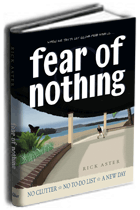If you are “good at” multitasking, recent research on the subject hasn’t been good news. In one study after another, multitasking has been shown to be bad for productivity — you could get the same things done faster if you could address them one by one. Multitasking is as bad for your mood as it is for your brain. It tends to leave people feeling frazzled, distressed, depressed. It rewires the brain in a way that reduces a person’s effective intelligence, and not just a little, but well below the level of a fully functioning adult. Much of this change in brain structure persists — researchers don’t know for how long, perhaps weeks but perhaps years, but either way, for some period of time your thinking capacity is reduced for everything you attempt, whether multitasking or single-tasking. This effect is so pronounced that some have said quite bluntly that multitasking causes brain damage. Researchers trying to find the exceptions, the people and situations for which multitasking has a beneficial effect on productivity or at least mood, keep drawing a blank. Every task they can think of testing is made worse by trying to do it at the same time as any other task.
And now there is worse news than all this, when it comes to multitasking. Multitasking never gets any better. It only gets worse.
Psychologists who measured task performance for multitasking say it’s not something you ever get good at — just the opposite, in fact. The more comfortable you are with multitasking, the more automatically it comes to you, the more confident you are that it helps you get things done . . . the more certain it is that multitasking gets in your way. Frequent multitaskers suffer a bigger loss of productivity from divided attention than do those who attempt to multitask only with great reluctance, and who look like they are stumbling around as they do it. It seems the more often you multitask, the worse you get at it and the more harm it does to you.
If this recent study can be taken at face value, multitasking isn’t a skill you can learn, but more like a form of overdrive. In multitasking, it seems, you push past your cognitive capacity, and you suffer damage in proportion to how far you push yourself. It’s like driving faster than your car can go, or filling a washing machine with more clothes than it can hold. It might look like it works, but you’re wearing down the machinery in the process.
There is still much more to learn in this area, and the studies aren’t exactly consistent. Brain-scan studies, for example, seem to say that you can comfortably do two things at one time, but the performance studies say you can’t. Anecdotally, we know multitasking works well sometimes — at least we think we know that. The inability of researchers to verify even one such instance objectively should call that common cultural knowledge into question. “Obvious” multitasking situations, such as tweeting while watching a TV show, have been studied and rejected. If multitasking hurts your results even in these situations where it seems the obvious thing to do, then it surely can’t be beneficial in the other situations where it already seems like a compromise.
Even after seeing all this one-sided scientific evidence, I am not ready to tell you to stop multitasking. I am, after all, a musician who plays the drum set. That means I hold drum sticks in my hands and strike an arrangement of five to 15 drums and cymbals that originally were considered separate instruments. If six generations of drummers can do that, then surely there are other combinations of actions that we consider multitasking that go together just as naturally. Nevertheless, the fact remains that we don’t know yet what these natural multitasking combinations are, and there are surely far fewer of them than we were thinking just last year.
As I read it, the latest word on multitasking is this: When you don’t have to, don’t. If it has become a habit, break that habit. When you must multitask, do so consciously, realizing that you are not saving any time and are surely frying some of your brain cells. Looking only at the productivity angle, multitasking is what you might do when you have a lot to do, but you don’t care about actually getting any of it done.
For the situations that call for multitasking, plan to spend at least the same length of time doing something that is relentlessly single-minded to help your brain recover. Meditation is the first thing that comes to mind, but some researchers suggest juggling for this purpose.
Juggling? Isn’t that the same thing you’re doing when you’re multitasking? Well, no. Have you ever tried real juggling? It may look hard, but it is harder than it looks. If you are distracted by anything else, even just for a moment, the bean bags fall to the sand and you have to start all over. Real juggling is a task that strongly rewards single-focused attention, and that is exactly why scientists think it is so beneficial for the brain.
So if “juggling” is your approach to life, find a way to spend less time “juggling” . . . and more time juggling! You’ll feel better doing things one at a time, and you’ll also work faster and get more done.



No comments:
Post a Comment